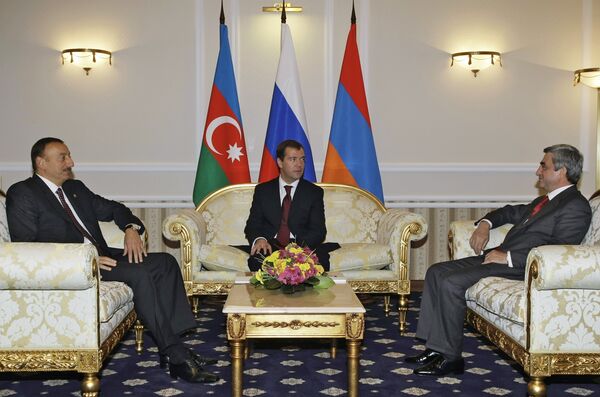In less than a fortnight after Russia signed a deal with Armenia Russian president Dmitry Medvedev heads to Baku to discuss the urgent issues with the Azerbaijani government. Some experts believe that this highest level visit is aimed at soothing the effect of Russian-Armenian military agreement. Political analyst Viktor Nadein-Rayevsky, a senior fellow of the Russian Academy of Sciences’ Institute of World Economy and International Relations, shared his views on the situation in the South Caucasus.
Samir Shahbaz: Mr. Nadein-Raevsky, good afternoon. Russia extended the lease on its base in Armenia from 2020 to 2044. It has already aroused some indignation in Azerbaijan. Though this action, taken by Russia was not so unexpected. Right now Dmitry Medvedev is heading to Baku where he will face the burning questions. What will be these questions and how would you describe Russian policy in the South Caucasus region?
Viktor Nadein-Rayevsky: There is no doubt, that the main issue that concerns Azerbaijan is the ongoing conflict in Nagorny Karabakh. We know perfectly well, that both parties hold different views on settlement of this conflict and demand too much of each other. But no significant mutual concessions have yet come to pass. Azerbaijan seeks to liberate what they call the occupied territories. Moreover, Baku often adheres to the uncompromising position according to which Karabakh must be annexed to Azerbaijan. There are definitely other claims. A wide response came after Russia delivered its air defense units to Armenia. Many questions were raised about the renewal of the lease of the “Gabalinskaya” radar center and its international use. Another important issue is the economic cooperation. Russia has good prospects of effective cooperation in this sphere – we show interest in Azerbaijani oil. In addition we have already signed gas contracts.
Security system in the Caucasus remains a very important problem. Kremlin implements restrained policy in Nagorny Karabakh. It tends to leave the right to settle this conflict to parties involved without interfering. Russia wants international participation to be equal and balanced, at least external players must not upset existing balance. Destabilization can lead to unpredictable consequences. Nobody wants a new war in this region, especially Russia.
S.S. : Can we consider Armenia our main ally in the region? How has Russia shifted its policy towards former republics of the Soviet Union, which are independent states today?
V.N.R.: In my opinion Kremlin today shows respect for their independence. That attitude appeared long ago. Anyhow, under the Putin administration that position has already been visible. Russia didn’t try to impose policy of diktat. Moscow respects the rights of independent states. Looking back at modern history we can see that every breach of these rights was perceived very painfully by former Soviet republics. That is why Russia seeks to maintain current system of relations with these states. For example, Russian leadership didn’t oppose the West strengthening its positions in Azerbaijan because it is strictly right of an independent state.
In relations with Armenia Russia has kept its position. For Kremlin Erevan is the most reliable ally in the South Caucasus, and this fact influences significantly on shaping of Russian policy in this region. But this fact doesn’t mean that Russia acts only in the interests of Armenia. Moscow has considerably improved relationship with Baku lately. The top level visit will play an important role in strengthening relations with Azerbaijan, although they need additional nourishment. First of all Russia should show that it is not going to back up either country. Moscow continues to remain a mediator in this conflict and therefore must carry out cautious policy.
S.S. : How do you evaluate Azerbaijan as the leading economic power of the region? Baku shows perhaps the most active economic growth and not only among former republics of the U.S.S.R.
V.N.R. : Azerbaijan has indeed significantly grown economically. The main source of incomes is of course oil export. Baku profits from gas export to a lesser extent, since the bigger part of it is spent for domestic consumption. “Oil” money flowed directly to Azerbaijan economy and that became a reason for success.
Another important factor is the acquisition of modern technologies that was brought by new shelf development companies. In addition much will depend on Azerbaijan’s ability to restart developing its industry. It’s not a secret that deindustrialization became a real disaster for almost all of the former Soviet republics, including Russia. At present Azerbaijan has a potential to develop progressive technologies due to income from oil. A big advantage for Azerbaijan is that this money is sent to develop oil refining because final product is always much more profitable. In general, quality of life in Azerbaijan has improved significantly in recent years.
S.S. : Let’s digress from the relationship between Russia and Azerbaijan on a state level and switch to relations between people.
V.N.R.: Azerbaijanis are not considered aliens; the same could also be said about people from other Caucasian republics. They are not treated as foreigners here. Azerbaijanis speak very good Russian. Azerbaijani business is widely represented in Russia; in addition they are the main resellers of Iranian goods. Russia is a large labour-market for them. Azerbaijanis can often be met among intellectual elite and medicine.

